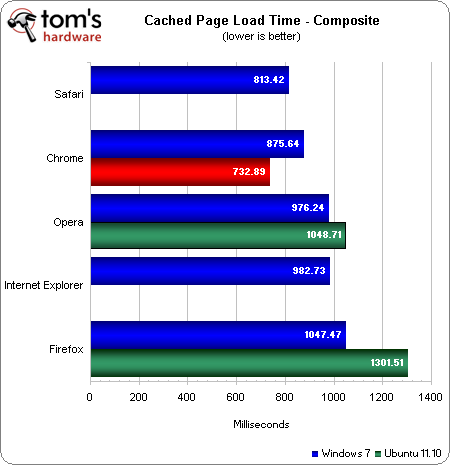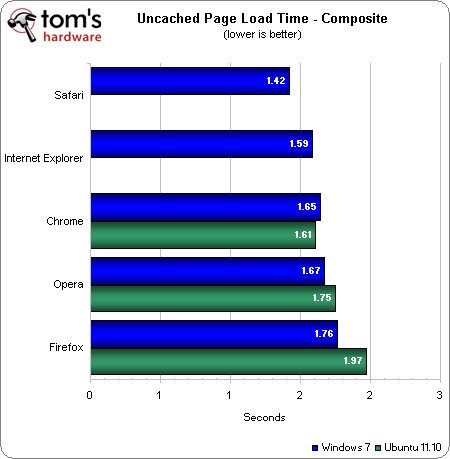Web Browser Grand Prix 9: Chrome 17, Firefox 10, And Ubuntu
Last month, we ran WBGP VIII on a MacBook Air, representing browser performance in a native Mac environment. Today we're returning to the PC. But the cross-platform comparison theme continues with a long-overdue rematch to WBGP 2: The Linux Circuit.
Page Load Time Performance Benchmarks
We use the same test pages as the eight-tab startup time tests, plus Tom's Hardware for the individual page load time tests. The test script is the same as the single-tab startup time, except we open each browser to a blank tab and navigate to the test pages after browser startup. The browser composite scores are achieved by averaging the load times for each of the nine test pages.
Cached Page Load Times
Cached page load time represents the amount of time you would wait for a browser to display a page that you've already visited (like a home page, a bookmark, a history entry, and so on).
When it comes to loading a site you've already seen in Windows, you just can't beat Apple's Safari, which earns an average cached page load time of 0.8 seconds. Close behind with a time of just under 0.9 seconds is Google Chrome, which only needs 0.73 seconds in Ubuntu, beating all of the Windows 7-based browsers. Safari takes third place in Windows 7 at just under one second, and second place in Ubuntu 11.10. IE9 places fourth with a Windows 7 time just under one second. Firefox finishes last at more than one second, while its Linux version takes 1.3 seconds, placing last on that platform as well.
The charts below contain the detailed view of the individual test pages in the cached page load time test, for each operating system.
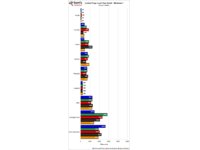
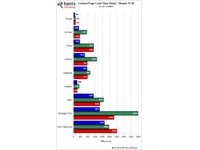
Uncached Page Load Times
Uncahced page load time indicates the wait for a page you've never visited before, like a search result or an external link off of a favorite site.
Get Tom's Hardware's best news and in-depth reviews, straight to your inbox.
Safari takes a first-place finish when asked to load new Web pages. IE9 comes in second, it's time achieving a big step up from where the browser finished in our cached page test. Chrome places third in Windows at 1.65 seconds, but takes first in Ubuntu with a time of 1.61 seconds. Opera places fourth in Windows and second in Ubuntu with scores of 1.67 and 1.75 s, respectively. Firefox again places last in both operating environments.
Below are charts containing the detailed view of uncached page load times for each OS.
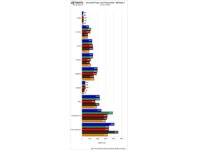
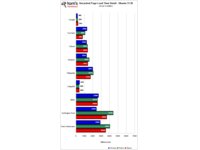
Realistically, the scores for both cached and uncached page loads see all of the contenders separated by tiny slivers of time. The only clear winners are Safari and Chrome for Ubuntu. The only stand-out loser is Firefox under Ubuntu.
Current page: Page Load Time Performance Benchmarks
Prev Page Startup Time Performance Benchmarks Next Page JavaScript Performance Benchmarks-
mayankleoboy1 just wondering if use of a DX11 capable GPU will change scores in some HTML5 and other benchmarks as the browsers use DX11 assisted rendering.Reply
Also, AMD driver support in linux is poor compared to Nvidia.
For future Linux articles, can you use a Dx11 based Nvidia GPU? -
mayankleoboy1 IMO, Firefox is concentrating more on HTML5, ignoring CSS and JavaScript.Reply
It does well in HTML5 benches but 99% of the websites use primarily CSS and JS and HTML3, in which Firefox does poorly.
-
mayankleoboy1 Waiting for OPERA12. It keeps impressing me.Reply
Even without hardware acceleration, it keeps up with the competition,
When that beast launches, it will kill FF/IE and most probably chrome too. -
PreferLinux Who wants to guess that the poor Linux Flash and WebGL results were because Flash and WebGL don't use hardware acceleration with that graphics card and driver? I would be thinking so.Reply -
mitch074 Firefox performance took a dive starting with version 4, where all hardware acceleration was disabled: before then, in version 3.6, XRENDER was used when available (it was 4/5th as fast as IE9 on the same PC) while it is now really slow - it's all software.Reply
Moreover, the only driver enabled for hardware acceleration on Linux is the Nvidia driver: according to Mozilla (and verified by yours truly on AMD and Intel hardware), most display drivers in Linux suck when it comes to 2D rendering - ouch. Note that Mozilla and Google could add shims to circumvent those bugs, but they don't -not worth the effort, especially when driver makers could fix their bugs rather easily, leaving the browsers broken yet again. -
indian-art I use Chrome (19.0.1041.0 dev presently) the most on Linux (Ubuntu) and empirically I felt Chrome works very well. Now your tests confirm it.Reply
I find Opera 12 really nice too. It can run with Opera 11.61. Opera 12 has a silver icon & 11.61 has its classic red. I like Firefox & Epiphany too.
Its a shame Safari and IE are not truly cross-platform. -
mayankleoboy1 how many of those top 40 sites use HTML5?Reply
i think that the HTML5 scores should be weighed by a factor of the percent of top40 sites that use HTML5.
This way actual importance of HTML5 can be judged in real world. -
nd22 It's a shame Apple does not pay enough attention to the Windows market and optimize their browser! On Mac Safari is king of the hill - personal opinion of course!Reply
On Windows I feel that IE9 works really well for me, although Chrome is the speed demon! FF 4+ lost their appeal for me. -
forestie The OSes that are used are 64 bits but the browsers are mostly (all?) 32bits on Windows, and probably 64bits on Linux.Reply
Internet Explorer has 64bits builds on Win7, and Firefox has "almost" a 64bits browser on Windows too: Waterfox, which is a semi-official Firefox for 64bits Windows. Waterfox in particular claims huge improvements over base 32bits install, I would like to see how that translates into real-world.
Not sure about availability of 64bits editions of other browsers on Windows.
Here are my wishes:
-clearly mention if the 32bits or 64bits version of the browser is used
-where applicable and relevant, test with both 32bits and 64bits variants. I would like to see IE and FF split into 32 and 64 variants on Win for example.
I personally migrated from FF to WF on my machines 3 weeks ago and find it noticeably faster in everyday use. WF is now my main browser. -
doive1231 As long as phones keep using Android, Chrome will be the most popular browser for a long while. Google have got it all sorted.Reply
